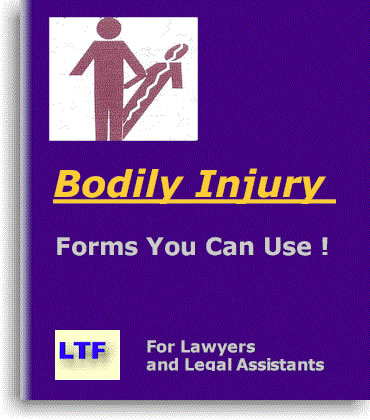Plaintiff’s Request for Admissions re Medical Expense establishes you as an experienced attorney who is not going to take defense denials that violate ethics rules on denying undisputed facts.
This discovery form to request admissions eliminates waste of your time and money gathering foundational evidence to prove each of your client’s medical expenses was reasonable. (Plus formally requesting admissions gives you the defendant’s written admission to show the jury! That’s a powerful way to build juror confidence in your proof at trial.)
Plaintiff’s Request for Admissions re Medical Expense gives you:
- a form first letter to defense counsel (that you can put into evidence in a motion for sanctions, showing how reasonable and professional you are), and
- a form for your follow-up Rule 37 demand that defendant admit the foundation requirements for your client’s medical expenses.
When the defense denies everything (a general denial) answer, they are trying to make you use your valuable time proving everything, even things not reasonably in dispute. Don’t take it! Throw the burden of time back at them! Make them take their time responding to you! Show the defense you mean business. A hard-hitting Plaintiff’s Request for Admissions re Medical Expenses gives you an effective use of Federal Rule 37 (and the like state rules). Save your time of otherwise having to prove every expense at trial, first the amount, and then the amount as “reasonable and necessary”. Do two things:
- Send the defense a nice letter enclosing a medical authorization from your client for them to inspect medical records. (A suggested letter is included in your purchase of this form.) The defense is going to see all the medial records of your client sooner or later. You may as well give them access now to them to show your “no nonsense” approach. After the defense has the medical authorization, they have a difficult time denying our targeted Plaintiff’s Request for Admissions re Medical Expenses.
- Sixty days after you sent out letter with medical authorization, send out our hard-hitting Plaintiff’s Request for Admissions re Medical Expenses. Because you have given the defense access to the records, the trial judge is not going to see why the defense cannot make up its mind whether the expenses were reasonable and necessary. The defense knows then that denying your request for admissions is going to lead to the judge hitting them with sanctions.
The words “targeted” and “hard hitting” in the two sentences above are deliberately chosen. Our Request for Admissions (RFA) form sends the defense attorney a no-nonsense notice of consequences in a way that gets him/her thinking seriously about their game of denying the “amount, necessity, and reasonableness” of every medical expense. Our RFA form is civil and polite, but it is firm and unyielding. It tells the defense attorney that you know the civil rule that requires him/her to admit any part of expenses that he/she can not affirmatively attack as unnecessary or unreasonable. Our targeted Plaintiff’s Request for Admissions form firmly tells the defense attorney you are going to seek attorney fees and sanctions at trial if they do not follow the rules – right now. This form contains words that makes the trial judge your friend if the defense has no affirmative attack on the medical expenses you list.
And that’s not all. If the defense denies your request, the way we have framed it, a defense denial of reasonable medical bills, becomes a defense personal attack on the medical ethics of the medical providers. If the defense attorney does deny the requests, this form gives you a real wedge to drive the doctor to being firmly on your side of the cases. Show the treating doctor the defense denial. You can tell the treating doctors that [use the name of the defense attorney] is questioning their medical treatment as being unreasonable and wrong, or unnecessary treatment and being charges over what other doctors charge in the community. You will find your doctor witness is now enthusiastically on your side: cooperative about appearing at trial to say how badly your client was hurt, and why the doctor had to order the treatment, and that the charges are the amount expected for the injury. When the defense attorney knows the doctor is going to be irritated – really angry – because the defense claims “unreasonable and unnecessary” medical expenses, the defense loses its enthusiasm for making you take your time at trial to get the medical expenses in evidence.
Put the defense in a corner. Use the polite but aggressive LawyerTrialForms™ Request for Admissions (RFA).
 Dear Fellow Attorney,
Dear Fellow Attorney,
While practicing for over 35 years, in a successful five state litigation practice, I developed and refined a comprehensive set of litigation forms. They saved me time, and made me more effective for my clients.
Most attorneys have no real system of hard hitting forms. They waste time.
But that doesn’t have to be you.
You get a great idea and a well drafted demand for admissions — with the wording you need to psychologically drive the defense attorney and please the trial judge who doesn’t like to waste time proving the obvious. You get a form you will use over and over, case after case. And there is no risk to you at all.
Request for Admissions is a very low investment with a high value return.
If Request for Admissions re Medical Expense saves you just one hour of time – ever – it will have paid for itself. Attorneys who are using my system right now are saving valuable hours every year.
All The Best,

Leonard Bucklin, Civil Trial Attorney


